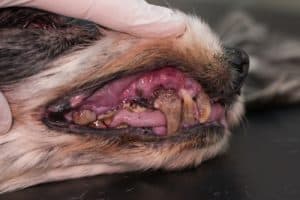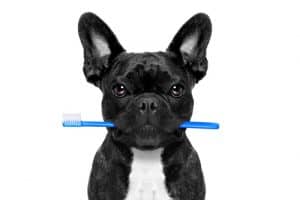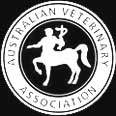Dental
When there is a build up of bacteria, food particles and saliva on the teeth plaque is formed. Plaque sticks to the tooth surface above and below the gum line and if not removed will calcify into tartar (also known as calculus). This appears as a yellow-brown material on the teeth. Over time the bacterial infection in tartar causes irreversible changes to occur. These include the destruction of supportive tissues and bone, resulting in red gums, bad breath and loosening of teeth. This same bacterial infection is also a source of infection for the rest of the body (such as the kidney, liver and heart) and can make your pet seriously ill. Ultimately, dental disease results in many pets unnecessarily suffering tooth loss, gum infection and pain. It also has the potential to shorten your pet’s lifespan.

Peanut the 6 year old Pomeranian, an example of severe dental disease. Peanut required extractions (6 in total) and a scale and polish.
What if my pet has dental disease?
Your pets teeth will be checked at each annual health check. However if you are concerned or notice any of the following signs including bad breath, loose or dirty teeth, trouble eating or dropping food, aversion to hard foods and chews this is an indication to have a dental check up sooner. Then if required you pet can be brought in for a professional dental clean.
A professional dental clean involves an anaesthetic, full exam of every tooth, extractions of non-viable teeth and scale and polish off remaining teeth. The majority of patients go home on the same day.
Following a professional dental clean, a plan needs to be implemented to minimise build up of tartar again, and will depend on the severity of your pet’s dental disease.
This may involve regular tooth brushing, feeding raw meaty bones and/or a special diet. It is recommended that all pets be examined 6 months after dental cleaning to determine the effectiveness of your dental care routine.


We have a number of products available for preventative dental care.
How can I minimise ongoing dental disease?
Long-term control and prevention of dental disease requires regular home care. The best way to begin this is to acclimatise your pet from a young age. Dental home care may include:
- Brushing teeth daily – just like us! This is the best form of dental hygiene. Pet toothbrushes and toothpaste are now available. Please do not use human toothpaste formulas as they are not designed to be swallowed and may be toxic to your pet.
- Feed pets raw meaty bones or special dental diets. This can help reduce the accumulation of tartar.
- Use dental toys, enzymatic chews, or teeth cleaning biscuits, all of which may help keep the teeth clean.
Regular and frequent attention to your pet’s teeth may avoid the need for a professional dental clean under anaesthetic, and will also improve your pet’s overall health.
Contact us
See you and your furry friend soon!





